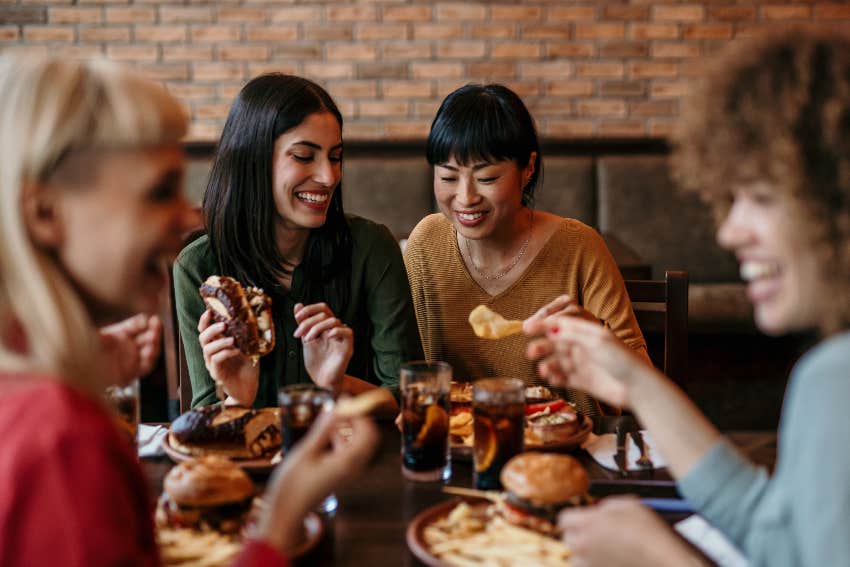Psychology Says If Someone Does These 12 Things In Conversation, They Have Amazing Social Skills
How to finally have the social acumen of the savviest conversationalists.
 digitalskillet | Canva
digitalskillet | Canva I am what many people would consider “popular” by normal standards. However, this wasn’t always the case. In school, I was a social disaster beyond disasters. Nobody ever invited me to a party. I craved attention and sought it out in awful ways. My lack of social and communication skills, and my anger at people, made people avoid me.
It was only during the later years of my college life that I realized that I needed to learn how to improve my social skills and emotional intelligence. With a lot of time, mistakes, and effort, I’m now the person who people call up — and it's because I've embraced the skills that anyone can use in conversation to up their social acumen.
If someone does these things in conversation, they have amazing social skills:
1. Talk to strangers
I know this is not going to be popular advice, but you have to talk to people in real life to get social skills. The best way to do this, from my experience, is to join classes that have interesting subjects, go to bars, or go to nightclubs.
These places often have singles and groups of people who are there just to socialize. This way, you can meet new people and get used to talking to them.
One thing that helped me was learning how to blend in with clothing. At the places I go to, most people make a point of flaunting extreme fashion and hip-hop sneakers. I wear the same, and that makes people click with you very quickly compared to how they’d act if you wear something that’s not appropriate.
Talking to strangers will also come with rejection. Rejection is a part of life, and you will have to deal with rejection. Rejection will hurt, but socializing is often a numbers game. No one, not even the popular kids, is instantly accepted everywhere they go, even if it seems that way to you.
However, if you were in the same boat that I was in, it shouldn’t hurt as much as you’d think it would. After all, people already were rejecting you before. The only difference now is that you have a chance at finding acceptance elsewhere.
Besides, you never know what will happen later on. A lot of the people who rejected me or even bullied me in the past ended up coming around later on after they realized I wasn’t that bad of a person.
2. Make plans with people, then actually follow through
 La Famiglia / Shutterstock
La Famiglia / Shutterstock
Be the one who first chooses to hang out with others! This is how you get friends who you can hang out with regularly.
Once you make plans, make a point of making it the best time possible and focus on your friend rather than yourself. This way, you’ll make sure that they want to chill again.
That being said, sometimes plans fall through. Don’t get discouraged if this happens. However, if the people in question reject plans three times or more in a row, it’s safe to say that they probably don’t want to hang out with you.
Don’t scold them or blow up at them; just let it go and prioritize someone else. Chances are that they will eventually come around.
A study published in Psychological Science concluded that if you initiate a conversation with someone you don't know, try actively suggesting a future interaction or activity to develop the connection further instead of just having a brief chat and moving on.
The key to connecting with others is being curious about them while allowing them to feel heard and listened to.
3. Stop trying to mimic popular people
This was my biggest issue when I was in school. I saw that the cool kids liked things I hated or couldn’t afford, so I pretended to like what they liked, pretended to know inside jokes I didn’t, and even tried to talk in that weird Valley girl accent they had. At times, I even tried to one-up them, which only made things worse.
Looking back, I realized part of why they didn’t like me was because I wasn’t myself. I was trying to be them and it was painfully obvious that it was the case. Had I just tried to be honest with myself (and them), I probably would have come across as a lot more interesting and genuine.
You are not the people you are trying to mimic; you’ll never be them. The only person you can be is yourself, so try to be the best version of that you can be.
4. Remember that people aren't as critical as you think — and that it doesn't matter if they are
I felt like everyone around me thought I was strange. So, I tended to cloister myself and not talk to anyone near me. It took a lot of moments when people I thought hated me approached me saying that they wanted to be included in my plans to realize that I often came off as icy and mean.
Sometimes, the snooty girls who were “cool” in my eyes actually would make a point of telling me I was. But the more I talked to people and befriended others, the more I realized that the people who made a point of telling me I wasn’t wanted were only doing so because they were too insecure to be polite.
Eventually, I ended up feeling sorry for them and then realized that the people who were cool with me often were in way better positions than the people who rejected me. Life’s too short to get hung up on small people.
The spotlight effect is a psychological phenomenon that makes us believe everyone notices us more than they do, causing us to overestimate how much others judge us. Most people are primarily preoccupied with their thoughts and problems, so they are not actively analyzing you in detail.
5. Avoid asking yes or no questions
The key to holding a conversation when you aren't the best at socializing is listening more than you speak.
So avoid asking direct questions that have a yes or no answer and instead ask more open-ended questions. This way you can get others to talk about themselves.
This is one of the surefire ways to have a conversation go further. People love to talk about themselves, so ask as many as you can, but remember to pay attention and actively listen to what they are saying. That way you will have a segway into your next open-ended question.
Follow the flow of the conversation and you will do just fine.
6. Offer compliments
One trick many people with good social skills do is to open a conversation by complimenting others. Oftentimes, this breaks the ice and gets the other person in a good mood.
Once you compliment someone, you can follow it up with a question. Let's say you like the person's shirt; in this case, you could ask them where they got it and go from there. Many people may offer up a story about how they obtained the item or how it makes them feel.
People like to receive compliments, so if you give one it will lighten the tension. And they may even offer one back.
It is a positive social interaction that boosts the recipient's self-esteem and creates a positive emotional response in the giver. Dopamine release is often linked to increased feelings of connection and well-being. Neuroscientists have shown that verbal affirmations light up the same areas of the brain as monetary rewards.
7. Stay in the know about current events
If you're uncomfortable in social situations because you often have no idea what people are speaking about, try getting up to date on current events. This way you understand the conversation and can even add to it.
Of course, try to avoid any controversial topics like politics and religion so as not to offend anyone. However, you can talk about other interesting news stories that seem applicable. You have something to talk to people about and can participate instead of being a wallflower.
8. Use body language
 JLco Julia Amaral / Shutterstock
JLco Julia Amaral / Shutterstock
Many people forget that body language is one key to becoming a sociable person. You wouldn't want to seem standoffish, which would guarantee no one would come up to talk to you.
Stop crossing your arms and sulking in a corner, avoiding social interactions. Instead, let your body be open to being approachable.
When speaking with someone, turn towards them and give a normal amount of eye contact. If you are shy this can be a bit intimidating. Start slow and then as you become more comfortable in the conversation, gradually increase the time you look at their eyes.
Eye contact makes people feel like they are being listened to, but be sure not to make them uncomfortable with any prolonged eye contact. Body language is a powerful nonverbal communication tool for socializing with others.
It can convey interest, confidence, openness, and positive emotions, helping to build rapport and facilitate connection by subtly signaling intentions and receptiveness to interaction through gestures, posture, eye contact, and facial expressions.
A study published in the Journal of Nonverbal Behavior found that body language interpretations can vary significantly across cultures. Therefore, it is important to be mindful of cultural norms when interacting with people from different backgrounds.
9. Fake it until you make it
You've heard the phrase "fake it 'til you make it," right? Well, it can be applied to becoming more sociable.
Try to act like the sociable people you know. Just start talking, even if you feel anxious or nervous. Plaster a fake smile onto your face and say hello to a stranger.
Decide right now that you're going to be a social person and do it. Don't let your fears or social anxiety hold you back. The more you talk to others, the easier it will get, and the less uncomfortable you will be.
10. Be polite and use manners
Politeness is a great tool for improving your social skills. Practicing manners have you saying, "Excuse me," "Thank you," "Please," and "You're welcome" to strangers on the regular.
When you're at a restaurant or coffee shop, use manners when you order. This can help chisel down your anxiety and nervousness about speaking with those you don't know.
Then you can step it up a notch and strike up a conversation by asking the cashier at the grocery store how they are or if the store has been busy. This can turn into short and sweet small talk that will boost your confidence.
Politeness in social interactions is a key strategy for maintaining positive social relationships. It involves respecting others' feelings, preserving their faces, and creating a sense of comfort and ease during interactions.
A 2011 study concluded this ultimately leads to smoother social exchanges and a more positive perception of oneself by others.
11. Don't overthink it
Overthinking can be a monster for those who are trying to become more social. It eats up all your confidence and keeps you from taking that step to say hello.
Get out of your head. This isn't life or death — this is a conversation! It's just talking. That's it. People who find socializing difficult often turn a simple conversation into an interrogation in their minds.
Don't go over an entire conversation in your head because it will never play out the way you think it will, which will only cause you to short-circuit and run. Just say hi. Most of the time you will get a hello back. And for anyone trying to improve their social skills, that is a win.
12. Brush off the bad interactions
Many people trying to improve their social skills feel discouraged when they think they can get everyone to like them. This is just not true, no matter who you are.
People’s taste in people is a lot like food. You could be an amazing pizza restaurant, but if they just aren’t fans of pizza, there’s nothing you can do to convince them to come to your door. This is okay, and it’s not your fault.
The psychology behind accepting that not everyone will like you is rooted in the understanding that people have different perspectives, values, and experiences, making it naturally impossible to please everyone and that clinging to the need for universal approval can lead to unnecessary anxiety and self-doubt.
A 2014 study found that it's about embracing that your worth isn't solely defined by others' opinions, allowing for healthier self-esteem and personal authenticity.
Overall, it takes a lot to make friends these days, but it’s worth it. Once you start having a social life, you’ll never want to go back to being a loner.
Ossiana Tepfenhart is a writer whose work has been featured in Yahoo, BRIDES, Your Daily Dish, Newtheory Magazine, and others.

